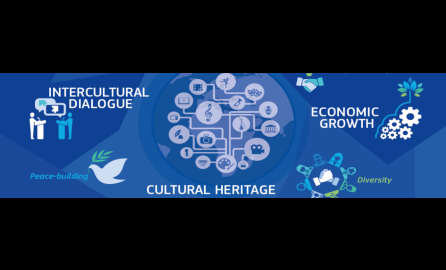EU Policy
Council conclusions on Culture in External Relations consider Culture as a key element of sustainable development and suggest a more integrated and strategic approach should be developed.
The Council conclusions on a transformative Post-2015 Agenda (2014) recognise that culture - including world cultural heritage and creative industries - can have an important role in achieving the 2030 Agenda inclusive and sustainable development goals (SDG), in particular, the SDG4 (Education), SDG5 (Gender), SDG8 (Sustainable Growth), SDG11 (Cities-Heritage) and SDG12 (Sustainable Consumption and production).
The EU promotes Culture in development with two specific objectives in line with the EU Development Policy: An Agenda for Change (2011): enhancing human rights, democracy and good governance, and promoting inclusive and sustainable growth.
The European Consensus on Development (2006) recognised culture as an important aspect of human development and as a tool for poverty eradication in the context of the achievement of the MDGs.
The EU is Party to the UNESCO Convention for the Diversity of Cultural Expressions (2005).The protection and promotion of the diversity of cultural expressions is thus an obligation to the EU, internally and externally. The Convention recalls that cultural diversity can only be protected and promoted only if human rights and fundamental freedoms are guaranteed. The objectives include fostering inter-culturality to build bridges among peoples. It recognises equal dignity and respect for all cultures.
The Cotonou Agreement [1](2000) (article 27) foresees to integrate the cultural dimension at all levels of development cooperation, support the cultural industries and enhance market opportunities for cultural goods and services, and to recognise the contribution of cultural actors and networks to sustainable development.
The global and European political and legal frameworks and the new EU financial instruments and programmes foreseen for the 2014-2020 period, particularly the Development Cooperation Instrument, the European instrument for democracy and human rights and the 11th European Development Fund (EDF), offer an opportunity to include cooperation in cultural sectors of activity and/or with a cultural dimension to promote development and to achieve EU external cooperation objectives.
There is increasing evidence derived by EU-funded projects about the important role that culture plays in cross-sectoral development:
Strengthening the Governance of Culture to Unlock Development Opportunities (EU/UNESCO, 2013-2015): A partnership project between UNESCO and the EU entitled “Expert Facility to Strengthen the System of Governance for Culture in Developing Countries” provides evidence of the positive effects of the participatory engagement of the culture sector in policy making and how governments can work together to unlock the potential of cultural industries for employment, social inclusion and poverty reduction. The Expert Facility has strengthened capacity in developing countries and enabled policy developments, namely in Vietnam, Seychelles and Burkina Faso.
A sample of 30 good practices have been selected and studied. The analysis demonstrates the potential impact of cultural and cultural sectors of activity as a vector for democracy, human rights and good governance, as well as for inclusive growth and social development.
[1] Cotonou Agreement, 2000 (revised in 2005 and 2010), integrate the cultural dimension at all levels of development cooperation, support the cultural industries and enhance market opportunities for cultural goods and services, and to recognise the contribution of cultural actors and networks to sustainable development.
In line with this framework, the ACP Cultures+ programme supported the fight against poverty through the development and consolidation of viable and sustainable cultural industries in ACP countries, by reinforcing their contribution to social and economic development, as well as the preservation of cultural diversity.
